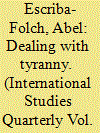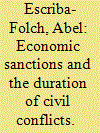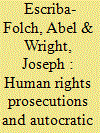|
|
|
Sort Order |
|
|
|
Items / Page
|
|
|
|
|
|
|
| Srl | Item |
| 1 |
ID:
096688


|
|
|
|
|
| Publication |
2010.
|
| Summary/Abstract |
This paper examines whether economic sanctions destabilize authoritarian rulers. We argue that the effect of sanctions is mediated by the type of authoritarian regime against which sanctions are imposed. Because personalist regimes and monarchies are more sensitive to the loss of external sources of revenue (such as foreign aid and taxes on trade) to fund patronage, rulers in these regimes are more likely to be destabilized by sanctions than leaders in other types of regimes. In contrast, when dominant single-party and military regimes are subject to sanctions, they increase their tax revenues and reallocate their expenditures to increase their levels of cooptation and repression. Using data on sanction episodes and authoritarian regimes from 1960 to 1997 and selection-corrected survival models, we test whether sanctions destabilize authoritarian rulers in different types of regimes. We find that personalist dictators are more vulnerable to foreign pressure than other types of dictators. We also analyze the modes of authoritarian leader exit and find that sanctions increase the likelihood of a regular and an irregular change of ruler, such as a coup, in personalist regimes. In single-party and military regimes, however, sanctions have little effect on leadership stability.
|
|
|
|
|
|
|
|
|
|
|
|
|
|
|
|
| 2 |
ID:
094690


|
|
|
|
|
| Publication |
2010.
|
| Summary/Abstract |
This article studies the impact of economic sanctions on the duration and outcome of intrastate conflicts. Sanctions are argued to foster the convergence of beliefs over parties' capacity, to reduce the utility of victory and to increase the costs of continuing fighting. Using a sample of 87 wars and new data on sanctions and sanction types, the author shows that sanctions and their durations are statistically associated with shorter intrastate conflicts. It is also shown that total economic embargoes are the most effective type of coercive measure in these cases and that sanctions imposed either by international organizations or by other actors have similar negative effects on war duration. In the second part of the article, the dependent variable is disaggregated, and I demonstrate that sanctions imposed by international institutions increase the likelihood of conflict resolution, whereas those sanctions not imposed by such institutions tend to increase the probability of a military victory. Moreover, if the targeted state is a member of the international institution imposing the sanctions, the effect of such coercion is even greater. Economic embargoes are also proven to increase the likelihoods of a military and a negotiated end, whereas international arms embargoes reduce the likelihood of a military victory.
|
|
|
|
|
|
|
|
|
|
|
|
|
|
|
|
| 3 |
ID:
139799


|
|
|
|
|
| Summary/Abstract |
Do human rights prosecutions deter dictatorships from relinquishing power? Advances in the study of human rights show that prosecutions reduce repression in transition countries. However, prosecuting officials for past crimes may jeopardize the prospects of regime change in countries that have not transitioned, namely dictatorships. The creation of the International Criminal Court has further revitalized this debate. This article assesses how human rights prosecutions influence autocratic regime change in neighboring dictatorships. We argue that when dictators and their elite supporters can preserve their interests after a regime transition, human rights prosecutions are less likely to deter them from leaving power. Using personalist dictatorship as a proxy for weak institutional guarantees of posttransition power, the evidence indicates that these regimes are less likely to democratize when their neighbors prosecute human rights abusers. In other dictatorships, however, neighbor prosecutions do not deter regimes from democratizing.
|
|
|
|
|
|
|
|
|
|
|
|
|
|
|
|
| 4 |
ID:
106943


|
|
|
|
|
| Publication |
2011.
|
| Summary/Abstract |
In this article, the probability of opening to trade is related to a country's propensity to learn from other countries in its region. It is argued that countries have different motivations to learn, depending upon the responsiveness and accountability of their political regimes. Whereas democracies cannot afford to be dogmatic, authoritarian regimes are less motivated to learn from the experience of others, even if they embrace policies that fail. Using data on trade liberalisation for 57 developing countries in the period 1970-1999, it is found that democracies confronting economic crises are more likely to liberalise trade as a result of learning; among democracies, presidential systems seem to learn more, whereas personalist dictatorial regimes are the most resistant to learning from the experience of others.
|
|
|
|
|
|
|
|
|
|
|
|
|
|
|
|
|
|
|
|
|